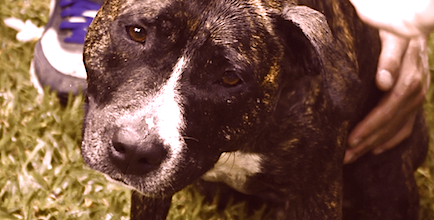How Media Coverage Unintentionally Encourages Animal Abuse
Caitlyn, the dog whose muzzle was taped shut, became an Internet sensation. Is that why there now seems to be a slew of copycat animal abusers?

Ever since the story of Caitlyn — the dog whose muzzle was bound with electrical tape — became a national sensation, similar stories of animal abuse have been popping up in news reports across the country.
Each new offender’s sneering mugshot led me to wonder, “Why does this keep happening?”

Don’t leave your pet’s safety to chance
Sign up for Petful recall alerts today.

First, Caitlyn. Then Another Dog. And Another…
At the end of May, the gruesome story of Caitlyn’s abuse made waves across the country. Her rocky road to recovery was in the spotlight as much as the news updates that eventually led to an arrest in the case.
Although her story of abuse ended happily, many others were just beginning. Suddenly, reports of dogs with taped muzzles are showing up all over the Internet:
- A German Shepherd in Colorado
- An Australian Shepherd in Colorado
- 3 dogs in South Carolina
- A pit bull in Florida
This isn’t limited to the United States. Witness the dog in Vietnam whose muzzle was cut to the bone with tape.
So, are these copycat crimes?
Jan Burttram’s theory: Probably not. Burttram is vice president of the Humane Society of McCormick County, where 3 dogs were recently recovered after having their muzzles and eyes bound in duct tape. “This type of thing happens more than we are aware,” she says.
That’s true — this kind of abuse probably does happen more than you’d think. We’ve seen several stories over the past few years where illegal dogfighters taped up the muzzles of bait dogs.
But let’s explore another theory. Let’s suppose that many of these new cases are copycat crimes.
The Danger of Media Overexposure
Although the sweeping coverage of Caitlyn’s abuse did lead to an arrest and shed some light on animal cruelty, what if it also spawned even more acts of cruelty?
“In the case of copycat crimes,” says psychologist Dr. Richard Amaral, “the attention these crimes receive in the media acts as a reward for those wishing to copy them.”
Most people had the same reaction to the story of Caitlyn; they were sympathetic and furious. But all that coverage may have been planting the seed of cruelty for animal abusers — or, worse, even glamorized the situation. According to Dr. Nigel Barber, “Publicity generated by spectacular acts of unmotivated aggression prompts imitators.”

Here’s How These Stories Should Be Covered
- Reporters should be careful to avoid glorifying the violence.
- Coverage should focus less on the gruesome details of the crime and more on the punishment of the criminal.
Here at Petful, we strive to publish heartwarming stories. Dave Baker, our editor in chief, tells me he didn’t even want to run anything about Caitlyn at first. “I couldn’t even look at that horrible photo of her nose and mouth bulging out of the tape,” he says, adding: “I wouldn’t want our readers to see it either.”
Yet coverage of the story was all over the Internet, and “we couldn’t just ignore it completely,” Dave tells me. The solution: “The first piece we wrote about Caitlyn, several weeks later, was not that she had been abused, but that she was recovering well and would soon enter foster care. We also shared the good news that her abuser had been arrested.”
See the difference?
What You Can Do to Help End the Abuse
There’s no simple answer to ending animal abuse. But organizations all around the world lobby for stricter punishments, raise funds and rescue neglected animals. You can help by:
- Donating funds to rehabilitate abused animals
- Volunteering for national organizations, such as the ASPCA
- Reporting animal abuse to the authorities
- Signing petitions to increase harsher penalties for abuse
- Raising awareness by encouraging others to do the same
As heartbreaking as it is, pet abuse is a prevalent problem. Rather than adding to the sensation of yet another animal abuse story by sharing it online, consider spending your time working to end the cruelty.
Ask your local news and favorite pets websites to focus on the punishment of the abuser instead of the sickening details of the crime. Support your local shelter and cruelty department, and spread the message that animal abuse will not go unpunished.







